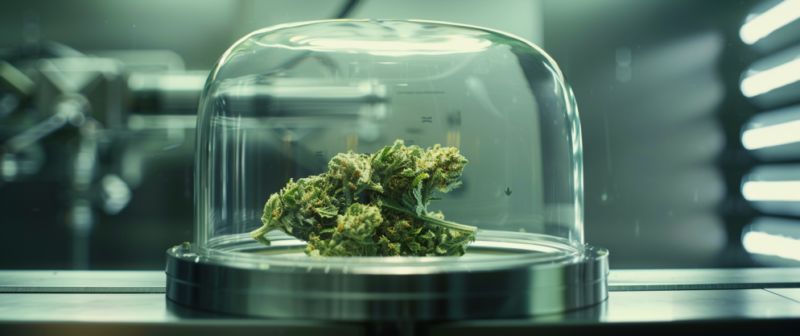What does Delta 8 Do
Delta 8 has been gaining popularity in the wellness industry, but what exactly does it do?
This article will discuss what does delta 8 do to our body, its potential effects, and the key differences between Delta 8 and Delta 9. We will also discuss the common uses of Delta 8, safety concerns, legal status, possible side effects, and how it can be consumed.
Stay tuned to learn all about the effects and uses of Delta 8.
What is Delta 8?
Delta 8 is a cannabinoid that is closely related to Delta 9 tetrahydrocannabinol (THC), and it is typically produced through chemical synthesis as an isomer of THC.
While Delta 9 THC is more well-known for its psychoactive properties, Delta 8 offers a milder psychoactive experience with potentially fewer adverse effects. This distinction has drawn attention from both recreational users seeking a more controlled high and individuals interested in the medicinal benefits of cannabinoids.
The chemical synthesis of Delta 8 involves altering the molecular structure of CBD or Delta 9 THC to create this cannabinoid. Being an isomer of THC, Delta 8 shares similar properties but with slight differences in how it interacts with the endocannabinoid system, potentially impacting its overall effects.
What Does Delta 8 Do?
Delta-8-tetrahydrocannabinol (Delta-8-THC) is a compound found in cannabis. When consumed, it interacts with the body’s endocannabinoid system, producing various effects. These effects may include feelings of relaxation, mild euphoria, increased appetite, and sometimes relief from discomfort and stress. The intensity of these effects can vary depending on factors such as dosage, individual tolerance, and method of consumption. It’s essential to use Delta-8-THC responsibly and be aware of its potential impact on your physical and mental state.
This interaction can lead to a range of effects, such as:
- Relaxation: Many users feel more relaxed after consuming Delta-8-THC, which can help reduce stress and tension.
- Mild euphoria: Delta-8-THC can induce euphoria, though typically to a lesser extent than Delta-9-THC. This can contribute to a sense of well-being and happiness.
- Increased appetite: Like its cousin Delta-9-THC, Delta-8-THC stimulates appetite, often resulting in food cravings, commonly referred to as the “munchies.”
- Improved mood: Delta-8-THC can contribute to an uplifted mood and a sense of relaxation, which may help reduce symptoms of sadness and improve overall well-being.
What Are the Common Uses of Delta 8?
Delta 8 is commonly used for both therapeutic and recreational purposes, with users seeking its potential benefits in areas such as discomfort management, relaxation, and mood enhancement.
Does Delta 8 Have Any Therapeutic Benefits?
Delta 8 is being researched for its potential therapeutic benefits, particularly in the areas of discomfort management and mental health, including stress relief.
Its potential anxiolytic properties have sparked interest among researchers exploring alternative therapies for stress disorders.
The ability of Delta 8 to induce a calming effect without the psychoactive intensity of Delta 9 THC makes it a promising candidate for individuals seeking relief from stress.
Can Delta 8 Be Used for Recreational Purposes?
Yes, Delta 8 can be used for recreational purposes, providing consumers with effects such as relaxation and mood enhancement.
Many users find that after consuming Delta 8, they experience a sense of calm and tranquility, making it perfect for unwinding after a long day or just taking a break from the stresses of daily life. The gentle high produced by Delta 8 can help increase one’s mood, making activities such as watching movies, listening to music, or socializing with friends more enjoyable.
How Can Delta 8 Be Consumed?
Delta 8 can be consumed in various forms, off
ering consumers different administration methods and dosage options.What Are the Different Forms of Delta 8?
Delta 8 is available in several forms, including oil, tinctures, candies, and vape products, each providing unique advantages and experiences.
Delta 8 oil is famous for its convenience and versatility, allowing for easy dosing and quick effects. Tinctures offer a potent and discreet way to consume Delta 8, perfect for on-the-go usage. Candies provide a delicious and enjoyable way to enjoy Delta 8 with precise dosage control. Vape products are known for their fast-acting effects and customizable experience, making them a preferred choice for many consumers. Each form caters to different preferences and desired outcomes, ensuring every individual has a Delta 8 product.
What Is the Recommended Dosage of Delta 8?
The recommended dosage of Delta 8 varies depending on the consumer’s experience and individual tolerance. Initial doses are typically low and gradually increased as needed.
When trying Delta 8 for the first time, it is essential to begin with a low dose to assess its effects on your body. Starting with around 5-10 milligrams is a standard recommendation for beginners. It is advised to wait at least 60-90 minutes before considering another dose to allow the full effects to be felt. Individual tolerance levels can vary greatly, so listening to your body and adjusting the dosage is crucial. Consulting with a healthcare professional before starting a new supplement regimen is always wise.
Where Can You Get Delta 8?
Delta-8 THC products are available through a variety of sources, both online and in physical retail locations. Here’s a breakdown of where you can find Delta-8 THC:
Online Retailers
- Dedicated Delta-8 THC Websites: Many companies specialize in Delta-8 THC products and sell directly to consumers through their websites.
- CBD and Cannabis Retailers: Online stores that sell a variety of cannabinoids often carry Delta-8 THC products.
- Marketplace Platforms: Websites like Amazon or eBay may have listings for Delta-8 THC products, but quality and legality can be more challenging to verify.
Physical Retail Locations
- CBD Shops: Many CBD stores have started carrying Delta-8 THC products. These shops often have knowledgeable staff who can provide information and recommendations.
- Smoke Shops: Vape shops and smoke shops frequently stock Delta-8 THC products such as cartridges, gummies, and tinctures.
- Health and Wellness Stores: Some health stores and wellness boutiques carry Delta-8 THC products, especially in states where cannabis products are legal.
- Dispensaries: In states where recreational or medical cannabis is legal, dispensaries may carry Delta-8 THC products.
What Are the Potential Effects of Delta 8?
Delta 8’s potential effects include mood enhancement, relaxation, and stress relief, which may contribute to overall well-being.
Delta 8 has shown promising potential in stress management, offering a calming effect that can help individuals cope with daily stressors. Users have reported experiencing a more balanced mood and improved sleep patterns when incorporating Delta 8 into their wellness routines. These therapeutic applications highlight the versatility and value of Delta 8 as a natural alternative for those seeking holistic well-being.
What Are the Possible Side Effects of Delta 8?
Possible side effects of Delta 8 may include confusion, nausea, and paranoia, with some users also experiencing adverse events under certain conditions.
Confusion can lead to disorientation and difficulty focusing, affecting daily tasks and productivity. Nausea may result in vomiting and loss of appetite, impacting overall well-being. Paranoia can induce feelings of fear and stress, leading to an uncomfortable mental state.
These side effects can be even more pronounced in individuals with underlying health conditions or those who are sensitive to cannabinoids. It is essential to be aware of these potential risks and monitor one’s reaction when consuming Delta 8 products.
What Are the Safety Concerns Surrounding Delta 8?
While Delta 8 offers various potential benefits, essential safety concerns must be considered, including the risks of side effects and the need for proper regulation and consumer information.
Is Delta 8 Legal?
Delta 8’s legality varies by jurisdiction, with some areas allowing its use under specific regulations, such as the Agriculture Improvement Act of 2018.
Delta 8 has emerged as a popular alternative to traditional cannabinoids due to its milder psychoactive effects.
Despite its growing popularity, the legal status of Delta 8 remains a complex and evolving landscape.
Regulated under the provisions of the Agriculture Improvement Act of 2018, Delta 8 THC derived from hemp is considered legal at the federal level.
Nevertheless, individual states have varying regulations regarding its production, sale, and consumption, leading to discrepancies and challenges for both consumers and businesses.
Things to Know about Delta-8 Tetrahydrocannabinol – Delta-8 THC
Delta-8 tetrahydrocannabinol, commonly known as delta-8 THC, is a psychoactive compound found in the Cannabis sativa plant, which includes both marijuana and hemp. Although delta-8 THC is one of over 100 cannabinoids naturally produced by the cannabis plant, it is present in only small amounts. Consequently, concentrated delta-8 THC is typically manufactured from hemp-derived cannabidiol (CBD).
Consumers should be aware that delta-8 THC products have not been evaluated or approved by the FDA for safe use in any context. These products may be marketed in ways that pose risks to public health and should be kept out of reach of children and pets.
Here are five essential facts about delta-8 THC to help keep you and your loved ones safe from potentially hazardous products:
- Delta-8 THC products have not been evaluated or approved by the FDA for safe use and may be marketed in ways that put public health at risk. The FDA is aware of the growing concerns surrounding delta-8 THC products currently being sold online and in stores. The FDA has not evaluated or approved these products for safe use in any context. Some concerns include variability in product formulations and labeling, other cannabinoid and terpene content, and variable delta-8 THC concentrations.
Some of these products may be labeled simply as “hemp products,” which may mislead consumers who associate “hemp” with “non-psychoactive.” The FDA is concerned by the proliferation of products that contain delta-8 THC and are marketed for therapeutic or medical uses, although the FDA has not approved them. Selling unapproved products with unsubstantiated therapeutic claims violates federal law and can put consumers at risk, as these products have not been proven safe or effective.
This deceptive marketing of unproven therapies raises significant public health concerns because patients and other consumers may use them instead of approved therapies to deal with serious and even fatal diseases.
- The FDA has received adverse event reports involving delta-8 THC-containing products. The FDA received 104 reports of adverse events in patients who consumed delta-8 THC products between December 1, 2020, and February 28, 2022. Of these 104 adverse event reports:
- 77% involved adults, 8% involved pediatric patients under 18, and 15% did not report age.
- 55% required intervention (e.g., evaluation by emergency medical services) or hospital admission.
- 66% described adverse events after ingestion of delta-8 THC-containing food products (e.g., brownies, gummies).
- Adverse events included, but were not limited to, hallucinations, vomiting, tremors, dizziness, confusion, and loss of consciousness. National poison control centers received 2,362 exposure cases of delta-8 THC products between January 1, 2021 (i.e., the date that the delta-8 THC product code was added to the database), and February 28, 2022. Of the 2,362 exposure cases:
- 58% involved adults, 41% involved pediatric patients less than 18 years of age, and 1% did not report age.
- 40% involved unintentional exposure to delta-8 THC, and 82% of these accidental exposures affected pediatric patients.
- 70% required healthcare facility evaluation, of which 8% resulted in admission to a critical care unit; 45% of patients requiring healthcare facility evaluation were pediatric patients.
- One pediatric case was coded with a medical outcome of death.
- Delta-8 THC has psychoactive and intoxicating effects. Delta-8 THC has psychoactive and intoxicating effects, similar to delta-9 THC (i.e., the component responsible for the “high” people may experience from using cannabis). The FDA is aware of media reports of delta-8 THC products getting consumers “high.”
The FDA is also concerned that delta-8 THC products likely expose consumers to much higher levels of the substance than are naturally occurring in hemp cannabis raw extracts. Thus, the historical use of cannabis cannot be relied upon in establishing a level of safety for these products in humans.
- Delta-8 THC products often involve the use of potentially harmful chemicals to create the concentrations of delta-8 THC claimed in the marketplace. The natural amount of delta-8 THC in hemp is meager, and additional chemicals are needed to convert other cannabinoids in hemp, like CBD, into delta-8 THC (i.e., synthetic conversion). Concerns with this process include:
- Some manufacturers may use potentially unsafe household chemicals to make delta-8 THC through this chemical synthesis process. Additional chemicals may be used to change the color of the final product. The final delta-8 THC product may have potentially harmful by-products (contaminants) due to the chemicals used in the process, and there is uncertainty concerning other potential contaminants that may be present or produced depending on the composition of the starting raw material. If consumed or inhaled, these chemicals, including some used to make (synthesize) delta-8 THC and the by-products created during synthesis, can be harmful.
- Manufacturing of delta-8 THC products may occur in uncontrolled or unsanitary settings, which may lead to the presence of unsafe contaminants or other potentially harmful substances.
- Delta-8 THC products should be kept out of the reach of children and pets. Manufacturers label these products in ways that may appeal to children (gummies, chocolates, cookies, candies, etc.). These products may be purchased online and at various retailers, including convenience stores and gas stations, where there may not be age limits on who can buy these products.
There have been numerous poison control center alerts involving pediatric patients who were exposed to delta-8 THC-containing products. In addition, animal poison control centers have indicated a sharp overall increase in accidental exposure of pets to these products. Keep these products out of reach of children and pets.
Final Thoughts – What Does Delta 8 Do
Delta 8 presents a promising option for those seeking alternative therapeutic and recreational experiences. Still, weighing its potential benefits against the associated risks and safety concerns is essential.
Delta 8 is known for its potential to provide milder psychoactive effects compared to Delta 9 THC, making it a desirable choice for individuals looking for a more gentle high. It is crucial to consider the lack of long-term research on the compound’s effects and the potential for adverse reactions, especially when consumed in high doses or by individuals with underlying health conditions.
Frequently Asked Questions
1. How does delta 8 affect the body?
Delta 8 interacts with the body’s endocannabinoid system, which regulates various functions such as mood, memory, discomfort, and appetite. It can produce multiple effects, including relaxation, discomfort relief, and increased appetite.
2. Is there a risk of addiction to Delta 8?
While delta eight does have psychoactive properties, it is not considered to be addictive like some other substances. However, as with any substance, it is essential to use it responsibly and not rely on it as a crutch for managing emotional or physical issues.
3. Is Delta 8 the same as Delta 9?
While both Delta 8 and Delta 9 are psychoactive compounds found in cannabis, they have slight chemical differences that affect their potency and effects. Delta 8 is known for producing a less intense high than Delta 9.


